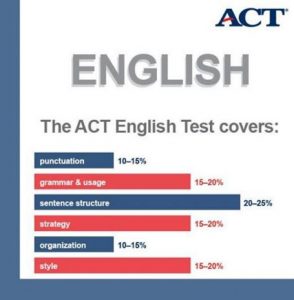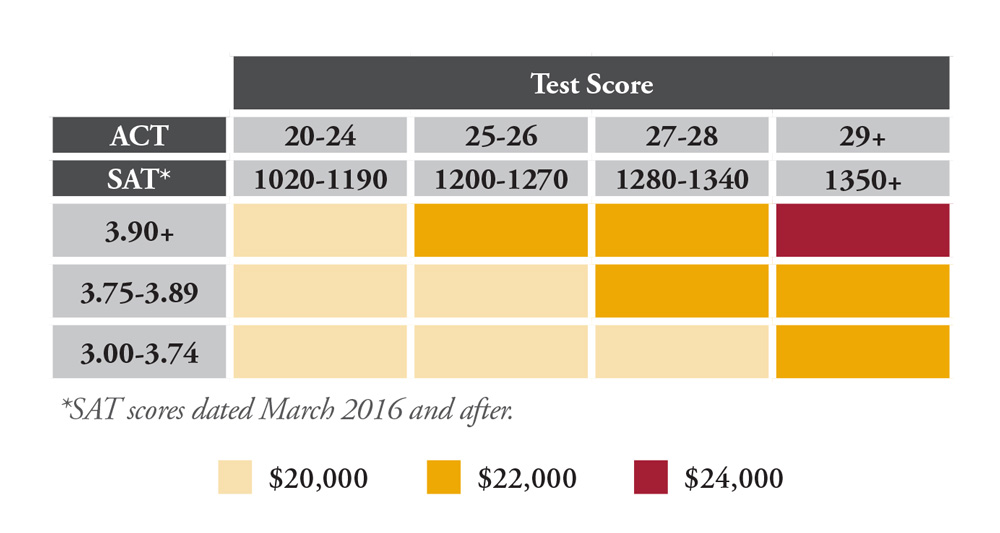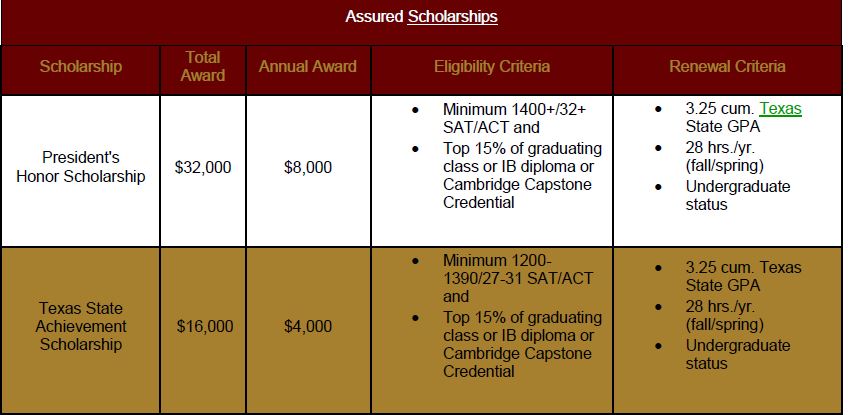Guest post by: David Recine, Magoosh
The link between ACT scores and getting accepted into school is obvious. Meet a school’s expectations, and you’ll get in. But what about the connection between ACT scores and paying for school once you’re accepted? That is never quite so obvious. Today, we’re going to take a closer look at how your ACT score can translate into money in your pocket… or at least, money applied to your tuition bill.
in. But what about the connection between ACT scores and paying for school once you’re accepted? That is never quite so obvious. Today, we’re going to take a closer look at how your ACT score can translate into money in your pocket… or at least, money applied to your tuition bill.
Which test is better for scholarships? The ACT or SAT?
The choice between taking the ACT or SAT can be a tricky one. But good news! Money is not one of the things you need to worry about as you try to figure out what test to take. Any scholarship that looks at ACT scores will also consider the SAT equivalent. So your best exam for scholarships is whichever exam you feel you’re the most confident with. If you’re not sure which test will give you the best path to scholarship success, take this ACT vs. SAT assessment. And bear in mind that the ACT scholarship advice in this article also applies to SAT scores.
All colleges will take either the SAT or the ACT, so you do not need to take both. The College Board and ACT created a concordance table to show the equivalent scores. Click here to see the table and testing timeline for the next school year.
What are the criteria for scholarships, in general?
First, let’s look at purely needs-based scholarships. These kinds of awards include the governmental Pell Grant, or the many private needs-based grants at top schools such Stanford and Princeton. To get a needs-based scholarship, you do of course have to be accepted to begin with, and that requires a qualifying ACT (or SAT) score. But beyond that indirect connection, ACT scores aren’t a factor in scholarship decisions.
Many scholarships, however, are merit-based, giving out funding based on the academic achievements or life accomplishments of students. And still other scholarships are primarily demographics-based. There are scholarships for just about every demographic out there: Native Americans, Italian Americans, men, women, Californians, first-generation university students, single parents, public high school graduates, Catholic high school graduates, you name it. Do these merit-based and demographic-based scholarships have ACT score requirements? Yes, sometimes… but sometimes not.
How do you figure out if a scholarship has an ACT requirement?
Any scholarship you can find online will have an official web page that includes eligibility criteria. Since many scholarships are specific to a single university, this official web page will often be found somewhere on the university’s official website. Check carefully to see if ACT scores are mentioned. If they aren’t mentioned, it still may not hurt to check with the university or scholarship foundation. Sometimes ACT scores are optional, but may be considered if you submit them.
How can you search specifically for scholarships that have ACT requirements?
If you’re asking this question, you probably have an excellent ACT score, and are looking for ways to capitalize on that. That’s great! And yes, there are ways you can seek out scholarships that are a good match for your ACT score.
One way to look for scholarships that may be ACT-based is to simply comb through scholarship databases. There are many of these on the web. Another crude-yet-effective way of searching for scholarships is Google. Since most scholarships out there are mentioned or listed on university websites, a custom Google search of sites whose address ends in “.edu” is especially helpful. If you’re not sure how to do a custom Google search in this way, I’ve created an example custom search for you. Check out that link and notice what has been typed into the search field.
I also recommend emailing or calling financial aid offices at any universities that have accepted you. If you’ve gotten an offer to enroll, the school’s financial aid workers are usually more than happy to help you find good sources of funding for your potential studies.
What kinds of awards can your ACT score get you?
So what awards may await you if you have a qualifying ACT score? Let’s take a look at two example scholarships.
With an ACT score of 27 or higher and a GPA of at least 3.5, you may be eligible for a fairly lucrative scholarship at the University of Missoula-Montana. This school’s Presidential Leadership scholarship awards students full  reimbursement of tuition at in-state rates. For students with exceptionally high ACT scores and GPAs, an additional cash stipend of $5,000-$7,500 is also awarded.
reimbursement of tuition at in-state rates. For students with exceptionally high ACT scores and GPAs, an additional cash stipend of $5,000-$7,500 is also awarded.
While Missoula doesn’t specify exactly which ACT score will get a stipend as well as the tuition reimbursement, many other schools do list scholarship award levels by ACT score range. For instance, Otterbein University in Ohio gives up to $16,000 in scholarships to students with a 26+ on the ACT. Students with a 21-15 on the ACT can potentially get a $12,000 scholarship, and students in the 18-21 may be eligible for a $5,000 award.
Will your ACT score be good enough for a scholarship?
If you haven’t taken your ACT yet, it’s a good idea to try to figure out what your score might be. This doesn’t just help you see what scholarships you might get; it also helps you see what schools you might get into. To feel out your future ACT score, you can take this mock ACT test online. If your score on the mock test is not what you want it to be, don’t worry. The beauty of practice tests is that if at first you don’t succeed, you can try, try again. With practice, you’ll be well on your way to an ACT score that is literally award-winning.

Scholarships at Simpson College

Scholarships based on SAT/ACT scores at University of Alabama

Scholarships at Texas State University

Scholarships at University of Alabama at Huntsville
